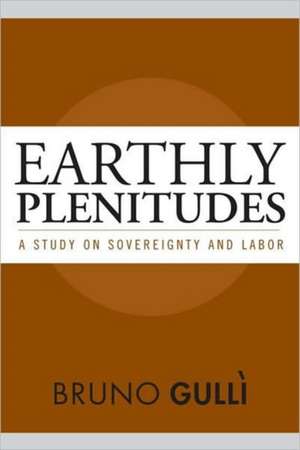Earthly Plenitudes: A Study on Sovereignty and Labor
Autor Bruno Gullien Limba Engleză Paperback – 31 mar 2016
Preț: 195.39 lei
Nou
Puncte Express: 293
Preț estimativ în valută:
37.39€ • 39.04$ • 30.87£
37.39€ • 39.04$ • 30.87£
Carte tipărită la comandă
Livrare economică 15-29 aprilie
Preluare comenzi: 021 569.72.76
Specificații
ISBN-13: 9781592139804
ISBN-10: 1592139809
Pagini: 200
Dimensiuni: 152 x 229 x 18 mm
Greutate: 0.3 kg
Editura: Temple University Press
Colecția Temple University Press
ISBN-10: 1592139809
Pagini: 200
Dimensiuni: 152 x 229 x 18 mm
Greutate: 0.3 kg
Editura: Temple University Press
Colecția Temple University Press
Recenzii
“Gullì is arguing for bold and radical theses which illuminate developments in the contemporary world, go beyond existing literature in the field in a dramatic way (by critiquing the very idea of sovereignty) and draw out the political implications of so-called postmodern theory. In my opinion, this is a seminal work.”—Anatole Anton, San Francisco State University
"Earthly Plenitudes is a deft study of sovereignty in its relationship to labor. It is a remarkably expansive work, weaving critiques of liberal philosophy with Nigerian literature, Calabrian idioms, St. Francis of Assisi, the Marx of the Grundrisse, the Belgian film La Promesse, Michael Moore’s Sicko, Jean Luc Nancy, and many other theorists, into an elegant text....[It is] especially rewarding for those who follow the text in its entirety and take seriously the author’s underlying ontology of labor."—Socialism and Democracy
Notă biografică
Bruno Gullì teaches philosophy at Long Island University, Brooklyn Campus, and at Kingsborough Community College. He is the author of Labor of Fire: The Ontology of Labor between Economy and Culture (Temple).
Cuprins
Acknowledgments
Introduction
PART I: Critique of Sovereignty
1. Singularity or the Dignity of Individuation
2. Exception and Critique
3. Bataille’s Special Use of the Concept of Sovereignty
PART II: Sovereignty and Labor
4. Ax and Fire: Knowledge Production and the Superexploitation of Contingent Academic Labor
5. Sovereign, Productive, and Effi cient: Th e Place of Disability in the Ableist Society
Conclusion: Labor without Sovereignty
Notes
References
Index
Introduction
PART I: Critique of Sovereignty
1. Singularity or the Dignity of Individuation
2. Exception and Critique
3. Bataille’s Special Use of the Concept of Sovereignty
PART II: Sovereignty and Labor
4. Ax and Fire: Knowledge Production and the Superexploitation of Contingent Academic Labor
5. Sovereign, Productive, and Effi cient: Th e Place of Disability in the Ableist Society
Conclusion: Labor without Sovereignty
Notes
References
Index


